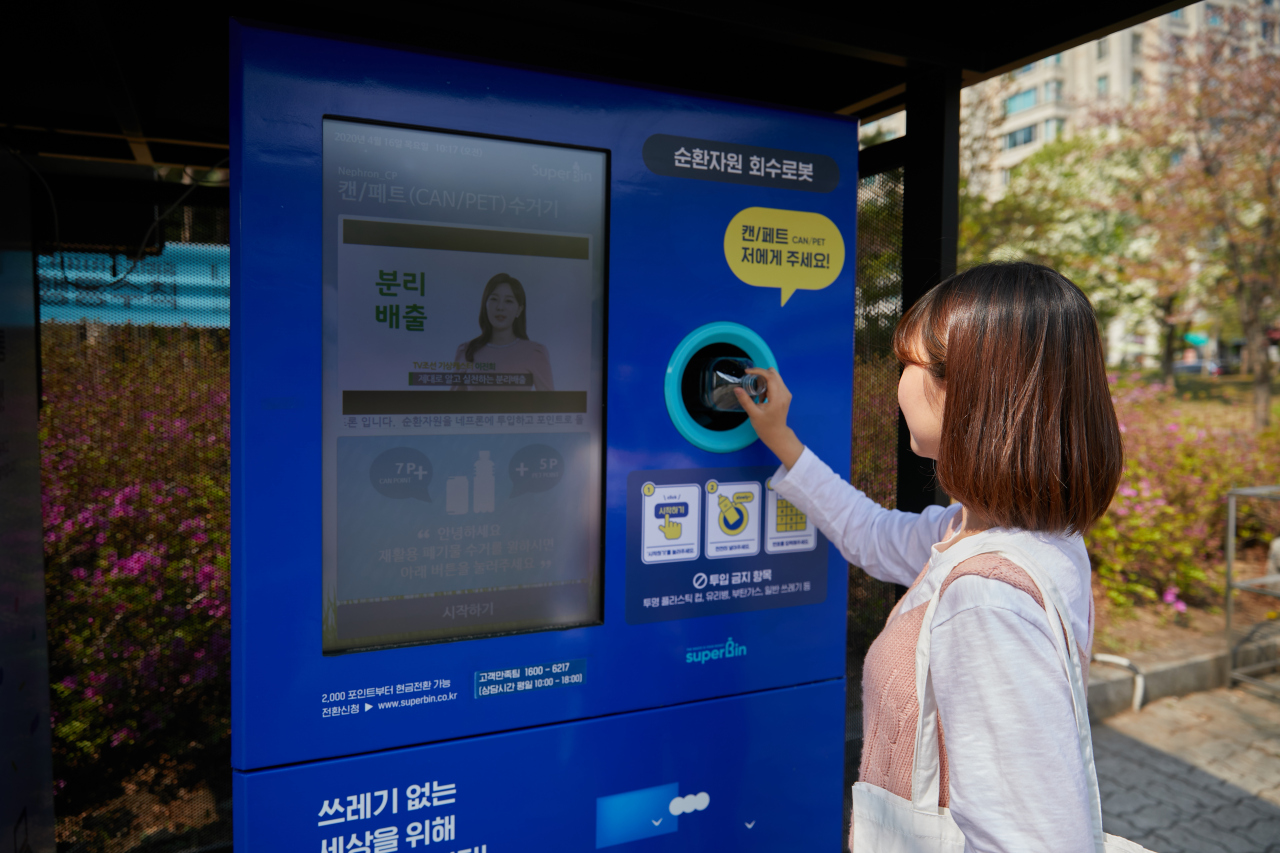
A Seoulite uses Nephron, a reverse vending machine developed by recycling solutions maker Superbin, to recycle plastic bottle in return for financial rewards in Yeouido, Seoul. (Superbin) via The Korea Herald
SEOUL — While nearly all industries affected by the lingering coronavirus pandemic, South Korea’s startup scene is showing resilience with local startups successfully attracting new funds.
Superbin, a startup that develops solutions for recycling plastic debris, announced this week that it has raised 20 billion won ($16.8 million) in Series B funding recently.
Investors participating in the funding round include portal giant Naver-backed investment firm TBT, and set-top box maker Humax, both of which already took part in the previous investment rounds, and local asset management firm Fine Investment.
Sae-a Global CNS also partook in the funding scheme as a strategic investor to utilize plastics collected via Superbin’s solutions in manufacturing garments.
“Superbin completed the latest funding round in a bid to expand its business scope,” said CEO Kim Jeung-bin.
“Companies from petrochemical and beverage industries are still showing keen attention to the recycling startup, hoping to make direct or indirect investments.”
The Bundang-headquartered startup, now valued at 100 billion won, rolls out a reverse vending machine, called Nephron, which gives financial rewards for people who recycle plastics.
Amid the growing awareness toward the environment, companies focusing on environmental, social and corporate governance, or ESG in short, have been riding momentum in recent years.
“The latest fundraise shows that Superbin’s innovative model that turns waste into useful materials has proved potential and sustainability to investors,” said Byun Dae-kyu, Superbin Chairman and CEO of Humax.
The startup is not the only company that has surprised the market by attracting large investment funds amid the virus crisis.
The travel and airline sectors have also take the brunt of the coronavirus impact, but Myrealtrip, which sell overseas travel packages, have successfully attracted 40 billion won late last month. Since its foundation, the company’s accumulative investments now reaches 82.4 billion won.
Led by local investment firm Altos Ventures, the startup’s existing investors IMM Investment and Smilegate Investment participated in the latest funding while Korea Development Bank, Axiom Asia Private Capital, Partech Partners, and Tekton Ventures newly invested in the travel startup.
Myrealtrip CEO Lee Dong-gun said that shifting the company’s focus from overseas products to local ones during the coronavirus pandemic hit the nail.
“The sales in the domestic market nearly quadrupled in recent months, compared to the pre-coronavirus period,” CEO Lee said.
The number of flight and accommodation bookings in April dropped to 40, compared to more than 10,000 in January this year. Swiftly changing its gears, the company, with more than 90 percent of travel products linked to overseas markets, started to put focus on the domestic market. Local travel packages have appealed to people who preferred having a getaway in Korea instead of flying overseas.
Global investors are more interested in investing in travel startups than local investors as they expect the segment will be able to recover fast when the coronavirus crisis starts to ease, according to the company.
Riid, an online educational platform operator, is a company that has been riding momentum created in the educational tech, which has been thrust into limelight thanks to growing interest toward non-face-to-face learning.
It attracted a new fund of 50 billion won last month from investors, including KDB, Nvestor, IMM Investment, and Intervest.
Founded in 2014, it has been offering tutoring services for English tests in Korea and recently deployed artificial intelligence to advance its educational platform.
“The need for practical and effective non-face-to-face educational solutions are on the rise, not only in the education sector but also in other industries,” said Jeon Jin-whan, a director at Intervest.
The edu-tech firm, which runs an AI lab in Silicon Valley earlier this year, said that it would roll out new services and expand its global partnerships.
With the Korean government’s efforts to prop up the reeling economy, startups fitted with differentiating business models and technology will continue to gather steam despite the coronavirus crisis, according to market watchers.